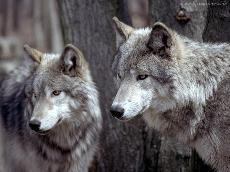The Bush Administration proposed a “License to Kill” plan that would allow hunters to shoot gray wolves, a recovering endangered species that was nearly hunted to extinction. Supporters of this measure claim that wolves have been causing unacceptable losses to big game herds.
Aerial gunning would be implemented in Wyoming and Idaho, and the reclassification of wolves as “predatory animals” would allow them to be hunted and trapped by anyone at any time. The Fish and Wildlife Service (FWS) fully supports this measure, claiming that population control would have little overall effect on wolf recovery.
The FWS proposal published in February stated, “wolf populations can rapidly recover from severe disruptions, such as very high levels of human-caused mortality or disease. After severe declines, wolf populations can more than double in just two years if mortality is reduced.”
Yet despite these findings, it has taken twelve years for the gray wolves to reach their current population.
The combined efforts of many conservation organizations reintroduced wolves into the wild in the midwest. The proposal under consideration would allow for any wolves outside of Yellowstone or Grand Teton National parks to be fair game for hunters and trappers. The FWS said that the 1,300 wolves roaming Yellowstone, Idaho, and Montana are around four times the number needed to consider delisting.
“The fact that we are talking about delisting means that some sort of success has been attained with recovery,” said Kyle Dell, assistant professor of political science. “What you typically see happening is an endangered species coming up against a narrow concentrated economic interest. This conflict is not a classical battle, though. It’s people’s sporting interests at risk.”
Currently, wolves are allowed to be killed if they are proven to be the primary cause of depletion in game herds. According to Environmental News Agency, the FWS wants to make it easier to kill wolves to protect big game herds by altering the definition of “unacceptable impacts.” The new definition, “one of the major causes of the population or herd not meeting established state or tribal management goals,” would expand the range of instances when wolf killing would be acceptable.
“Due to the bias in our state wildlife agencies, most wildlife is ignored or even hurt by state management priorities which favor a select few species that hunters and anglers desire,” wrote George Weurther, an ecologist who worked on wolf recovery, to New West. “Nearly all wildlife management is focused on enhancing populations of deer, elk, moose, and other ‘game’ species.”
Wolves and other predators fulfill a role in the ecosystem, according to Ted Adkisson-Wilkinson ’07, a current employee at Yellowstone National Park via email.
“Wolves will most times only go after the easiest members of a herd to kill,” said Wilkinson. “By killing off the weak members of a group future generations of the group grow stronger because the weak genes are eliminated.”
“The State of Wyoming would designate wolves as a ‘Trophy Game Species,'” wrote Wyoming governor Mitch Freudenthal in a letter to regional FWS Director Mitch King, according to Environmental New Service.
Conservation organizations like the Defenders of Wildlife are leading campaigns to keep the gray wolves listed as a protected species. The Defenders have set up funds to compensate ranchers who lose livestock to wolf predation, and strongly advocate non-lethal methods of protecting livestock herds.
Further information can be found at the Defenders’ homepage, savewolves.org.

